Today's Sunday • 11 mins read
— By Dr. Sandip Roy.
“Death smiles at us all …”
The quote above is famously credited to Marcus Aurelius, the last emperor of the Pax Romana (Latin for “Roman Peace”).
But he did not say or write those very words. Like these highly popular quotes that Marcus Aurelius never put down anywhere.
People believe those words are from Marcus because he was The Philosopher King. Modern Stoic scholar Donald Robertson calls Marcus “the last great Stoic philosopher of antiquity.”
So, what’s the story behind those words?
Did Marcus Aurelius Say, “Death smiles at us all?”
No, Marcus Aurelius did not say, “Death smiles at us all.” That quote is from the movie Gladiator (2000), where the lead character Maximus says it to Commodus, hinting that Marcus Aurelius said it. There is no historical evidence that Marcus Aurelius ever said or wrote that.
- Maximus: “I knew a man once who said, ‘Death smiles at us all; all a man can do is smile back.’”
- Commodus: “I wonder, did your friend smile at his own death?”
- Maximus: “You must know. He was your father.”
To be fair, that quote correctly paraphrases Marcus’ thoughts on death.
The Quote That Marcus Aurelius Never Said
Death smiles at us all; all a man can do is smile back.
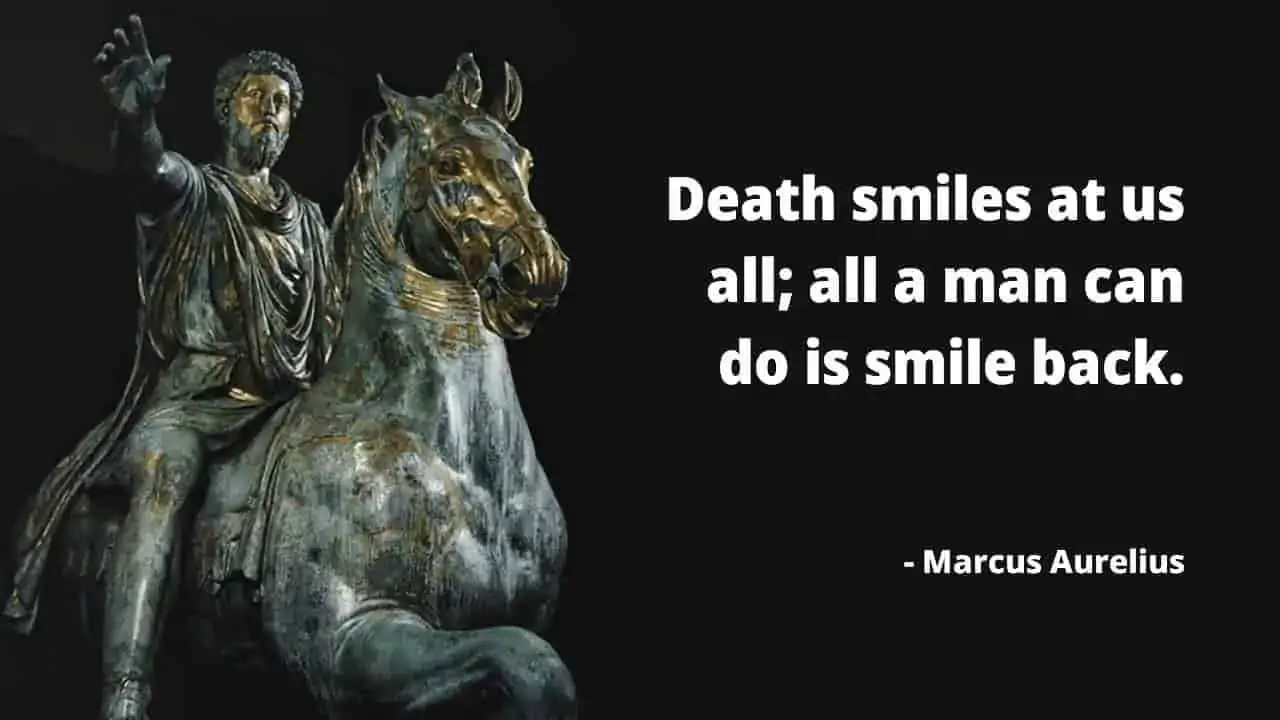
The Death Quote That Marcus Aurelius Did Say
A quote that comes very close to “Death smiles at us all…” appears as the last line of Marcus’s book Meditations:
“Pass on your way, then, with a smiling face, under the smile of him who bids you go.”
— Meditations 12.36, the last line (trans. Hans Urs von Balthasar)
- The same last line is translated by Gregory Hays as:
“So make your exit with grace — the same grace shown to you.”
— Meditations 12.36, (trans. Gregory Hays)

- Martin Hammond translates it as:
“Go then in peace: the god who lets you go is at peace with you.”
— Meditations 12.36, (trans. Martin Hammond)
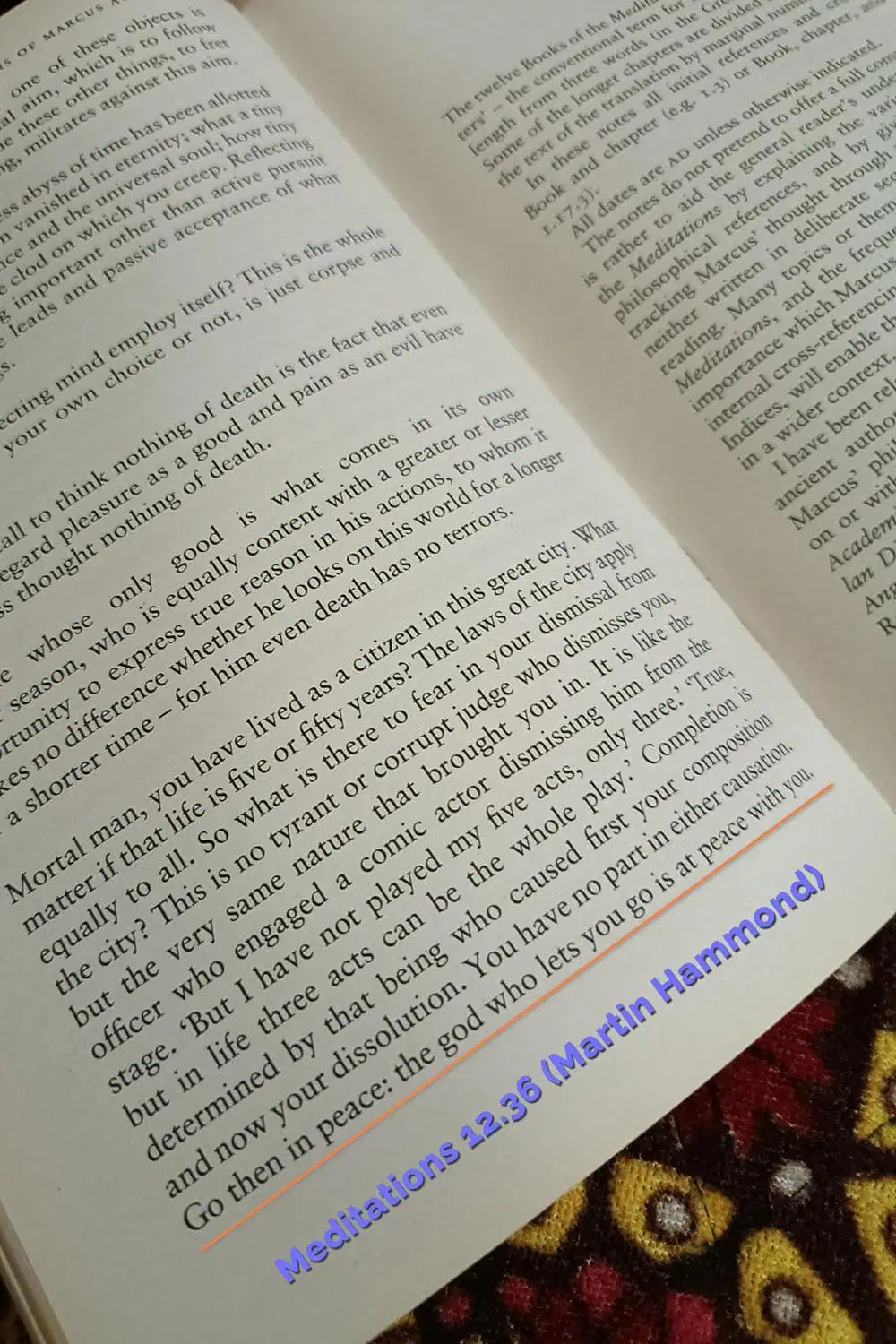
- George Long translates it as:
“Depart then satisfied, for he also who releases thee is satisfied.”
— Meditations 12.36, (trans. George Long)
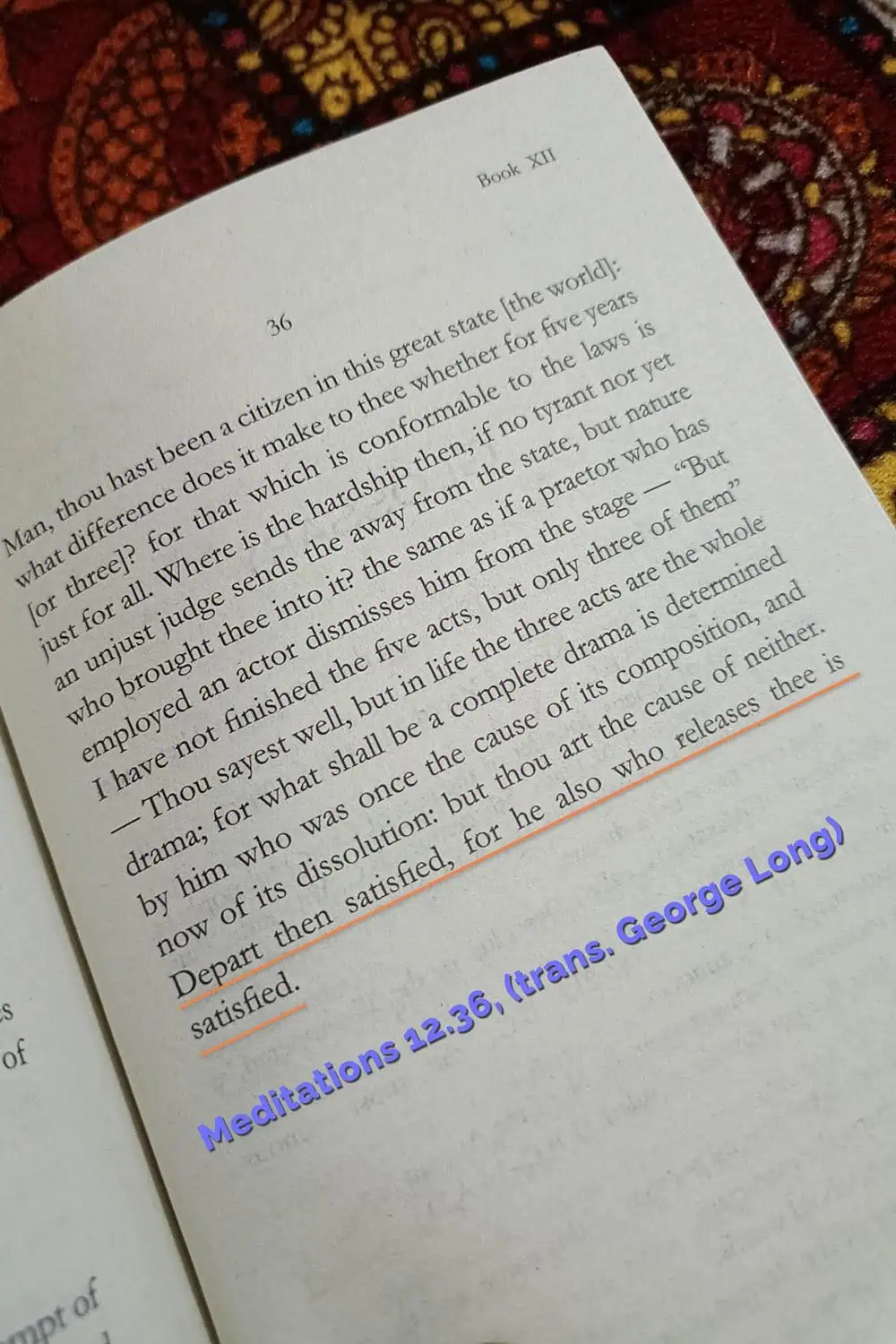
- And Robin Waterfield translates it as:
“Go serenely, then, matching the serenity of the god who is dismissing you.”
— Meditations 12.36, (trans. Robin Waterfield)
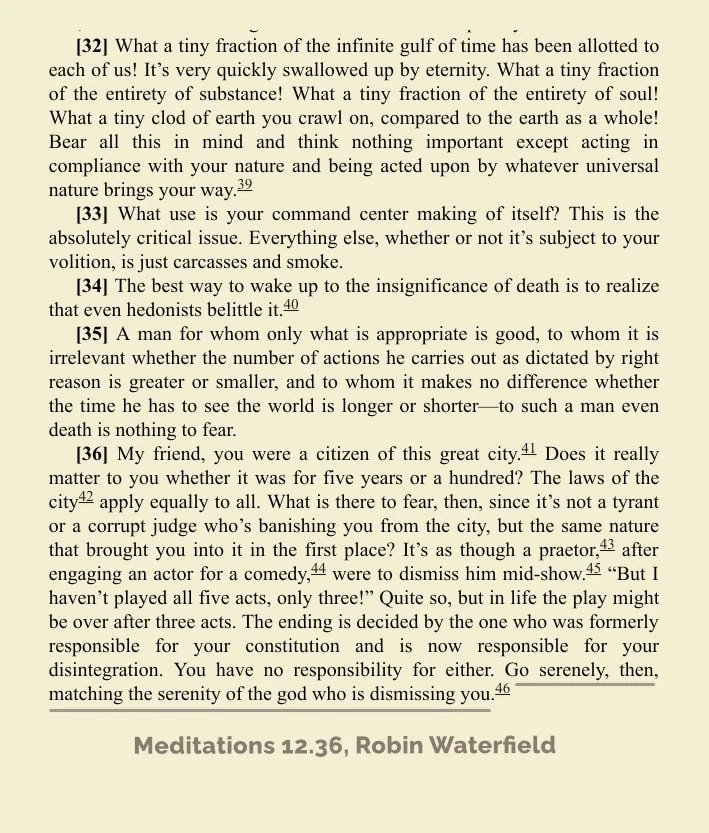
So, Marcus Aurelius did not say those exact words.
Another of Marcus’ quotes that comes close to “Death smiles at us all…” is this:
“Accept death in a cheerful spirit, as nothing but the dissolution of the elements from which each living thing is composed.”
— Meditations 2.17
Story of Maximus The Gladiator
“Death smiles at us all…” was spoken by the gladiator Maximus in the epic historical drama film Gladiator, loosely based on Daniel P. Mannix’s 1958 book The Way of the Gladiator.
The film won five Academy Awards at the 73rd Academy Awards, including Best Picture, and four BAFTA Awards at the 54th British Academy Film Awards, including Best Film.
Russell Crowe played Maximus Decimus Meridius — a general in the Roman army who intends to return home after victory against the Germanic tribes.
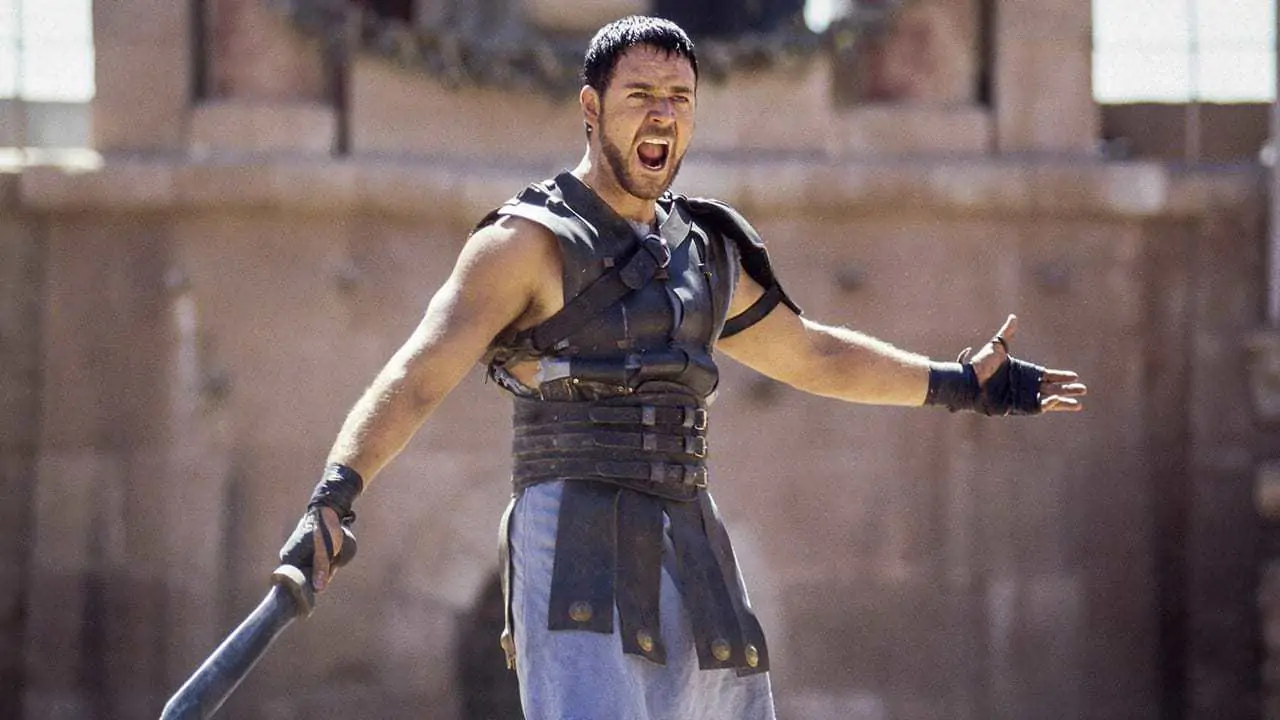
Early in the movie, when Maximus meets Marcus Aurelius, the Emperor reveals his wish for Maximus to succeed him instead of his son Commodus, to save Rome from corruption and restore the Republic.
Hearing this, Commodus flies into a jealous rage and murders his father — a blatant historical error; Marcus died of old age and disease.
Commodus then declares himself the new emperor of Rome and asks Maximus for his loyalty. When Maximus refuses, the Praetorian guards capture him for plotting to murder the new king.
Maximus escapes and runs to his home country, Spain. He collapses from grief there, finding his house burned down and his wife and son killed.
Some slave traders spot him and capture him. They sell Maximus to Proximo, a gladiator trainer who urges his fighters to see death as a Stoic would—natural and inevitable.
“Ultimately, we’re all dead men, sadly we cannot choose how, but we can decide how we meet that end in order that we are remembered as men.”
— Proximo, Gladiator
Maximus initially refuses to fight but soon turns out to be the invincible gladiator inside every arena he steps in.
In Rome, Commodus declares gladiatorial games to commemorate the death of his father. Proximo takes his troupe to the games.
There, Maximus leads Proximo’s team to victory, defeating stronger and fiercer competitors, much to the delight of the crowd.
Commodus goes into the arena to greet the winners. Up close, to his shock, he finds that Maximus is the victorious gladiator.
Maximus then defeats Rome’s only undefeated gladiator, Tigris of Gaul, but spares his life. He is now the favorite of the crowds.
Meanwhile, Commodus’ sister Lucilla and Senator Gracchus plot to overthrow and kill Commodus with the help of Proximo’s men. Commodus discovers the plot and sends the Praetorian guards to execute Proximo and all his gladiators.
Maximus gets captured and jailed. When they meet, Maximus challenges Commodus to a duel. In a surprise move, Commodus accepts.
They talk.
- Maximus: “You would fight me?!”
- Commodus: “Why not? Do you think I am afraid?”
- Maximus: “I think you have been afraid all your life.”
- Commodus: “Unlike Maximus, the invincible, who knows no fear?”
- Maximus: “I knew a man once who said, ‘Death smiles at us all; all a man can do is smile back.’”
- Commodus: “I wonder, did your friend smile at his own death?”
- Maximus: “You must know. He was your father.”
Maximus was alluding to Marcus Aurelius, father of Commodus.
Before leaving, Commodus stabs Maximus to weaken him. Even with his punctured lung, Maximus kills Commodus.
Before he falls, he orders the reinstatement of Senator Gracchus, effectively restoring Rome to a republic state, saying, “These are the wishes of Marcus Aurelius”.
Who killed Maximus?
Maximus dies of his wound—a punctured lung—inflicted earlier by Commodus.
History vs. Movie
From a historical standpoint, the film has many similarities, but also a few notable differences.
1. Is the story of Maximus the Gladiator true?
Gladiator, the film, is not historically accurate. Most of the story is fictional. Still, many parts reflect the actual events from Roman history.
The moviemakers modeled Maximus on Pompeianus, a senior commander in the Roman army during its wars against the Parthian and the Marcomannic tribes.
Like Maximus, Pompeianus rose from humble origins and became a distinguished general and a trusted advisor to Marcus Aurelius.
2. Did Maximus and Lucilla have a relationship?
In the movie, Lucilla (Marcus’ daughter) and Maximus had a romantic relationship when they were both young. It ended and both married separately. She became a widow after having a son, while Maximus had a son from his wife, and they lived back in Spain.
Historically, Lucilla was indeed Marcus Aurelius’ daughter and Commodus’ sister.
When the real Lucilla was around 13 years old, Marcus married her off to his brother and co-emperor, Lucius Verus. Six years later, she was widowed when Verus died on his way back from a battle.
A little later, Marcus Aurelius arranged her second marriage to Pompeianus.

3. Did Marcus Aurelius offer his throne to Maximus?
This appears to be true. Marcus had offered to name Pompeianus as his immediate heir and successor to the throne until Commodus was mature enough to become Rome’s emperor.
But Pompeianus declined, for reasons unknown to history. Marcus then promoted him to Chief General in the Marcomannic War.
Marcus was on his last few breaths before the war could end. From his deathbed, he asked Commodus to stay at the front to uplift the army’s morale, and Pompeianus to watch over Commodus.
But soon after Marcus’ death, Commodus left the camps. Thereon, it was Pompeianus who led the army.
Lucilla was there at the battlefront when Marcus died.
Lucilla returned to Rome and started her life as a private citizen, as the daughters of deceased Roman emperors were no longer considered first citizens.
Interestingly, Augustus Caesar, the first Roman emperor (27 BCE to 14 CE), adopted his wife Livia as his daughter, allowing her to retain her first citizen (princeps) status. In ancient Rome, princeps was the title given to the first citizen of the state, who held supreme power. Augustus started the trend, to avoid the negative stereotypes of monarchy and king, and presented himself as the first citizen.
In 182 CE, Commodus implicated Lucilla of being an accomplice in a failed assassination attempt on the Roman Emperor by Pompeianus’ nephew. Commodus banished her to the Italian island of Capri.
Sometime later, he sent a centurion to kill her. She was about 33 years old then.
- Unlike in the film, Marcus Aurelius never wanted to restore Rome to a republic state, as it had been before Augustus Caesar.
- History holds Commodus as an arrogant and inglorious son and a timorous and undeserving successor to Marcus Aurelius.
Claudius Maximus was another general who was close to Marcus Aurelius in his youth. This Maximus was a bona fide Stoic philosopher and was one of Marcus’ teachers.
Marcus mentions him in his book Meditations:
From Maximus [I learned]:
Self-control and resistance to distractions.
— Marcus Aurelius, Meditations, 1.15
Optimism in adversity—especially illness.
A personality in balance: dignity and grace together.
Doing your job without whining.
Other people’s certainty that what he said was what he thought, and what he did was done without malice.
Never taken aback or apprehensive. Neither rash nor hesitant—nor bewildered, or at a loss. Not obsequious—but not aggressive or paranoid either.
Generosity, charity, honesty.
The sense he gave of staying on the path rather than being kept on it.
That no one could ever have felt patronized by him—or in a position to patronize him.
A sense of humor.
Who Were The Five Good Emperors
Marcus Aurelius was the last of The Five Good Emperors and the mightiest Stoic to have ever walked this earth.
“The Five Good Emperors” were Nerva, Trajan, Hadrian, Antoninus Pius, and Marcus Aurelius. They ruled the Roman Empire between 96 and 180 CE. They ruled successively, but none of the five emperors were related by blood.
1. Nerva was chosen to ascend the throne by the assassins of Domitian, the king who had banished all philosophers from Italy. The Stoic sage Epictetus, one of those who formed The Stoic Opposition against the autocracy, had to flee to Nicopolis.
2. Trajan, a valiant warrior and a hero of the people, was picked by Nerva. Trajan reduced the taxes, started the “alimenta” fund system for poor children, and often visited people’s homes without his guards.
3. Hadrian, adopted by Trajan, traveled a lot. He was an architect, a poet, and a rhetorician. He climbed Mount Etna, in Sicily, and Jabal Agra near Syria, to watch the sunrise. Hadrian started the imperial trend of wearing a beard.
4. Antoninus Pius was adopted by Hadrian on the condition that he adopt the future emperors Marcus Aurelius and Lucius Verus to succeed him. He started the Puellae Faustinianae, a charitable institution for the daughters of the poor. He unexpectedly ruled for a long 23 years.
5. Marcus Aurelius was The Philosopher King. He ruled the Roman Empire for 20 years through wars and plague, with intelligence and prudence. Two centuries of peace and stability in the Roman Empire ended with his death in 180 CE. Marcus wrote the last great book on ancient Stoicism, Meditations.
“The Five Good Emperors” was a term first used by Machiavelli and later adopted and popularized by historian Edward Gibbon, who said under these men, the Roman Empire “was governed by absolute power under the guidance of wisdom and virtue.”
Gibbon wrote in The History of the Decline and Fall of the Roman Empire:
“If a man were called upon to fix that period in the history of the world during which the condition of the human race was most happy and prosperous, he would, without hesitation, name that which elapsed from the deaths of Domitian to the accession of Commodus.”
Undoubtedly, the two best among the five were Trajan and Marcus.
Final Words
Marcus Aurelius’ book Meditations, which first appeared in print in 1559, is still bought in large numbers today. If you want to know what he actually said, please pick up a copy of Meditations.
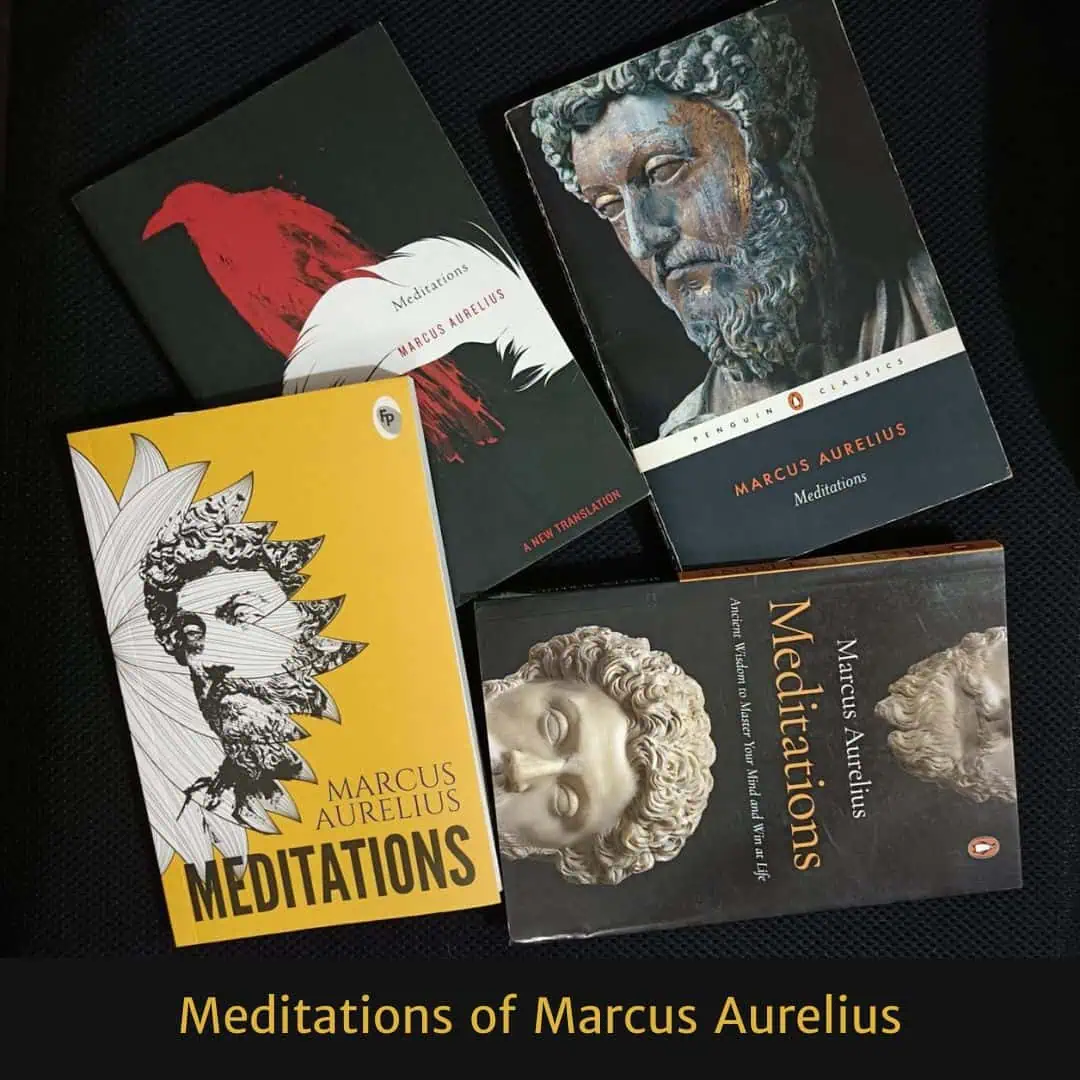
Death smiles at us all… was not uttered by Marcus Aurelius, but it fairly tells us in a terse sentence how the Stoics saw death — as a natural phenomenon not to be afraid of.
√ Also Read: What did Marcus Aurelius say on happiness?
√ Please spread the word if you found this helpful.
• Our Story!


